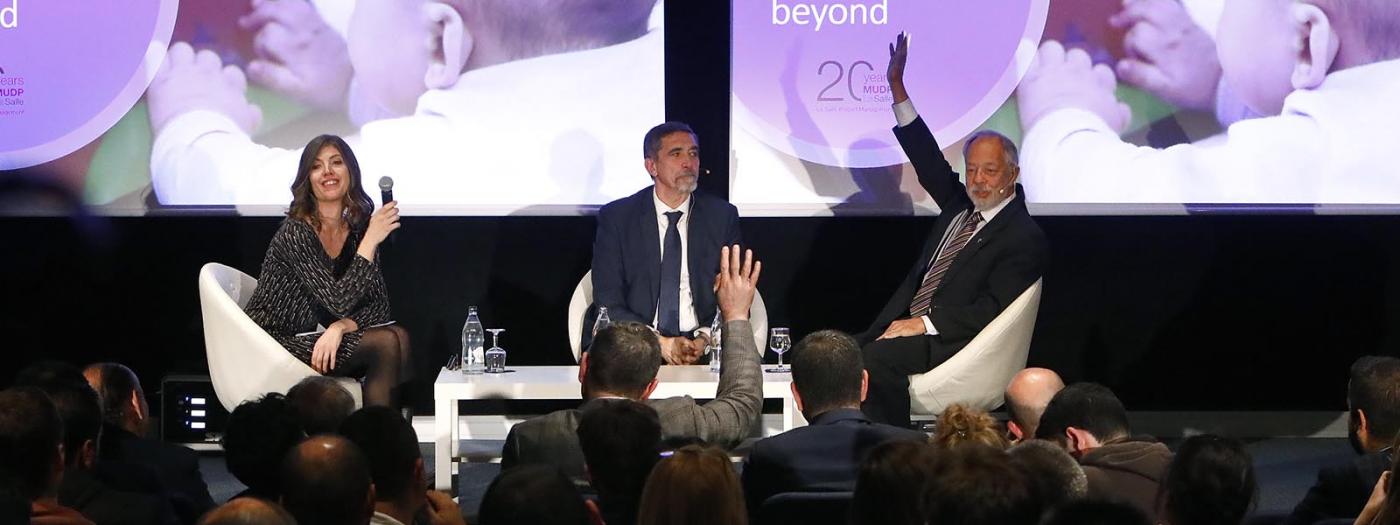On 14 November, Project Management Beyond 2020 was held, an to event inaugurate the events organised by La Salle-URL throughout the year to celebrate the 20th anniversary of its Master’s Degree in Project Management. It included a round table discussion with Xavier Albaladejo and Laurentiu Neamtu, leading experts in the project management field, and a face-to-face interview between two of the great gurus of the profession worldwide, Dr David Hillson ("The Risk Doctor") and Alfonso Bucero.
A PIONEERING INITIATIVE
At the beginning of the celebration, Josep M. Santos, General Director of La Salle Campus Barcelona-URL, recalled the beginnings of the master's degree. “Twenty years ago, this was quite the adventure: very few people had brought this knowledge to the university arena in a structured way. It’s a source of pride to see that our Master's and those who have studied it are now recognised in the world of business as leaders”.
After speaking of some of the original promoters of the project, Josep M. Piqué, Maypi Torné, Albert Cubeles, Josep Maria Bañeres, Diego Jódar and Angel Ros, he also welcomed the fact that, this year, the Project Management Office (PMO) has awarded the Master's Value Ring Certified Practitionercertification, making it the only institution in Spain to have been awarded this prestigious recognition.
TRADITIONAL OR AGILE?
In the first round table, “Project Management: Traditional or Agile? The eternal dilemma”, Xavier Albaladejo, vice-president of Agile-Spain, Coordinator of the Master's Degree in Agile Methods at La Salle-URL and Agile-Lean Executive Coach, and Laurentiu Neamtu, Coordinator of the Project Management knowledge area at La Salle-URL, Researcher with La Salle's Technology-based Entrepreneurship and Innovation Management group, GREITM, and guest speaker at the XI International Project Management, Leadership and Strategy Conference by the PMI in Lima, and with Sergio Ughetto, President of the PMI Barcelona Chapter, as moderator.
Neamtu concluded that “rather than asking if agile or traditional is best, we must define what we understand by value, how we generate it and how we deliver it, and also the culture and values of the company: in a traditional company it will be very difficult to apply an agile methodology, and vice versa”. “In reality”, he added, “these are complementary approaches”.
Albaladejo explained that “it is key that management be based on the people we work with, what skills they have and how they relate to each other”. According to Albaladejo, we have inherited the idea from traditional industrial methods that there is an elite doing the thinking and an interchangeable employee base that is limited to executing. “In an uncertain environment, quality spaces must be created so that all members of an organisation can think non-linearly, contributing more than just the sum of the parts.” How do you activate people to bring out the best in themselves? How do you get them to feel invested in what the company does?”
Both experts warned that often, we look for quick solutions to add to the already established operation of a company and, on the other hand, the implementation of a methodology, either traditional or agile, requires an investment of time to organise and, above all, for it to be a deep change, not a simple patch.
THE FUTURE OF PROJECT MANAGEMENT
Next, Dr David Hillson (The Risk Doctor), Vice President for updaing the Project Management Body of Knowledge, and Alfonso Bucero, Founder and Managing Partner of BUCERO PM Consulting and one of the most influential Project Managers in Spain, both considered worldwide as gurus of the profession, talked about the present and future of Project Management in the face-to-face “Project Management Beyond 2020” session.
The conversation between the experts revolved around three major themes that will mark the future of Project Management in the coming years: the use of AI in Project Management, Project Management for different generations and the importance of culture and attitude in Project Management.
As for the use of Artificial Intelligence systems, they concluded that it is useful to analyse the enormous amount of data that can be collected today, but as a support tool: machines will not be able to replace human beings in decision making and in the management of human relationships.
It is in the relationship between people that another of the keys to future project management can be found. “Today's market conditions mean that people from four different generations coexist together in the same work environment,” Hillson explained, “and they all have a different culture, values and way of working and understanding things”. The key is dialogue, to listen to each other and understand and adapt to each other in order to be able to collaborate effectively.
Both experts agreed that it is also a key aspect in the management of multicultural teams and dispersed teams: understanding different cultures and being able to adapt to others.
Bucero explained how the attitude of the members of an organisation is very important. “You need to lead by example, be like a mosquito but for good, infecting people in an organisation with a positive attitude”. This is paramount because, Hillson added, “attitude determines the end result: if you think you can, you'll prove yourself right. If you think you can't, you’ll prove yourself right too”.
“But it's not like flipping a switch,” Bucero said. “The attitude changes little by little, with work. You’ll end up being positive if you try every day”.
The event ended with a networking session where attendees and participants met and exchanged views.
